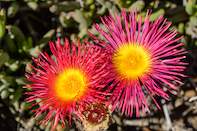The Baths
Other than oranges, Citrusdal is also known for its hot springs, these hot springs, known simply as the Baths, are located 18 km south of the town. The springs lie in a beautiful wooded ravine and the water heats up to a wonderful 43C. Amenities include jacuzzis, private baths and open-air swimming baths.

There is also a shop and accommodation available, this is certainly a place where you can unwind and relax. The history of The Baths is quite interesting. In 1739 a report came into the Council of Policy on Bushmen raids from Jan Cruywagen, where he recommended a military post be set up in the Olifants River Valley, “on the farm with the warm baths”.
The acting Governor of the Cape, Daniel van den Henghel, declared that the Dutch East India Company should erect “a handsome stone building” and thatched bathing huts for visitors to the area. To date, this much-modified homestead building still stands on the 18th-century original site.
Van den Henghel’s idea on the baths was sound, however as the baths were a long way from Cape Town, the company found them difficult to maintain and keep the property in good order. So, on the 15 May 1778, a letter was dispatched from the Castle of Good Hope, authorising Schalk William Burger, who owned Kamelksvlei farm which was nearby, to move to The Baths with his family. He was to keep the property in good condition and also to provide provisions such as poultry and fresh produce to any visitors that came there “to take to the waters.”
Baths for Sale
In 1855, when the British had been in power at the Cape for 60 years, they decided to sell The Baths on behalf of Queen Victoria. The first private owner was John Lawrence Sharp, who paid £350 for The Baths and 81 morgen (69,3 ha) of ground. Several owners followed — Johannes Jacobus Wiese, the London merchant Richard Grisold, Aletta Burger with her eleven children and Johannes Petrus Kirsten. Kirsten paid £2 000 for the property but sadly neglected it.
A Commission of Enquiry, set up in 1895, found that the roofs were leaking, the floors were full of holes and pigs were scavenging amongst the cooking pots! A doctor, called in to give evidence, still maintained that despite these conditions, 'there is no doubt that the Olifants River Baths, deserve the good repute for healing purposes which they have acquired'.
So persuasive was he that the commissioners themselves formed a syndicate and bought The Baths, planning a railway line from Porterville and many other improvements. The Anglo-Boer War intervened, however, and in 1903 James McGregor bought the property at an auction on the Grand Parade in Cape Town. It then passed down to his children, grandchildren and great-grandchildren, who own The Baths today.
The McGregor Family
James McGregor was a very remarkable man. When he first rode over the mountains, a short stocky Scot in a crumpled hat and velskoene with his goods piled on a wagon, no one thought him anything much better than a vagrant. He was given a room in a backyard to store his things. He was 'die uitlander ' (the foreigner) nothing more.
But James McGregor was shrewd — and hardworking. As a very young man, he had been to Australia, digging roads and panning for gold. When he saw the valley — rich and fertile and almost untouched — he realised that he had come to stay. In 1869 he bought his first land and then married the beautiful Lenie van Wyk, whose family had farmed there for generations.
They made him promise, with his marriage vows, that he would never take her to his foreign land over the sea. When this was signed and sealed, he was accepted, as one of them. He, they and the valley would never look back. By 1900 James McGregor owned 50 000 morgen (42 800 ha) of the finest land and was popularly known as the King of the Olifants River valley.
Three years later he bought The Baths, building good roads, an elegant balconied guest-house and several fine stone bath-houses, which are still there today. McGregor had three sons and seven daughters. When a young Norwegian engineer named Trygve Morch-Olsen arrived to build a bridge over the Olifants River, he married Lizzie McGregor.
His energy almost matched that of his father-in-law and, twelve years after old James died in 1914, he added a gabled dwarsgebou (affectionately known as Paddastraat), a large swimming pool, the boarding-house and bungalows. Today James McGregor's great-grandchildren are still improving The Baths. It is to their credit that they have brought The Baths into the 20th century without disturbing the timeless peace and beauty of the area.
 Guests in search of a serene vacation environment with natural splendour should opt for accommodation in Citrusdal, a beautiful agricultural...
Guests in search of a serene vacation environment with natural splendour should opt for accommodation in Citrusdal, a beautiful agricultural... Citrusdal is ideally situated for exploration of the surrounding mountains, valleys, farmlands and wildflowers. The town was founded by the ...
Citrusdal is ideally situated for exploration of the surrounding mountains, valleys, farmlands and wildflowers. The town was founded by the ...